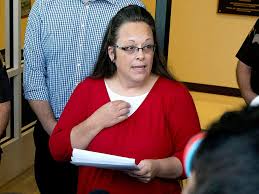
Introduction
Kim Davis, the former county clerk of Rowan County, Kentucky, gained national attention in 2015 when she refused to issue marriage licenses to same-sex couples, citing her religious beliefs. This controversial stance sparked a heated debate surrounding religious liberty, government authority, and LGBTQ+ rights, making her a significant figure in social and political discussions surrounding same-sex marriage.
The Events that Made Headlines
In June 2015, the U.S. Supreme Court ruled in Obergefell v. Hodges that same-sex marriage was a constitutional right, leading to widespread celebrations across the country. However, just a few weeks later, Davis’s refusal to comply with the ruling resulted in her being jailed for contempt of court. Despite this imprisonment, she remained steadfast in her beliefs, garnering both support and condemnation from various groups.
Some religious organizations praised her courage to uphold her convictions, while LGBTQ+ advocates criticized her actions as discriminatory and a violation of civil rights. The backlash against Davis was substantial, with many advocating for the separation of religious beliefs from government duty, emphasizing that public officials must adhere to the law.
The Ongoing Impact
Years after her refusal to issue marriage licenses, the implications of Davis’s actions are still felt in discussions about religious freedom and the rights of LGBTQ+ individuals in the United States. In particular, the issue raises questions about the balance between an individual’s religious beliefs and their professional responsibilities.
Current Perspectives
Fast forward to 2023, the debate around religion and government obligations continues, especially as some states enact laws protecting individuals and organizations that align their practices with their religious beliefs. This has sparked further dialogues about how these laws impact civil rights, especially for LGBTQ+ populations. Advocates for marriage equality argue that laws protecting religious beliefs should not come at the cost of individual rights.
Conclusion
Kim Davis’s case remains a critical example of the tensions between personal belief systems and public duties. As laws evolve and court cases continue to shape the landscape of same-sex marriage and religious freedom, the significance of her actions serves as a reminder of the complexities at play in the pursuit of equality and justice. The ongoing discussions around this issue highlight the need for a carefully balanced approach to ensure that both personal beliefs and civil rights are respected and upheld in contemporary society.



